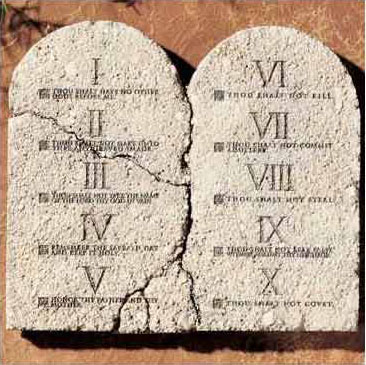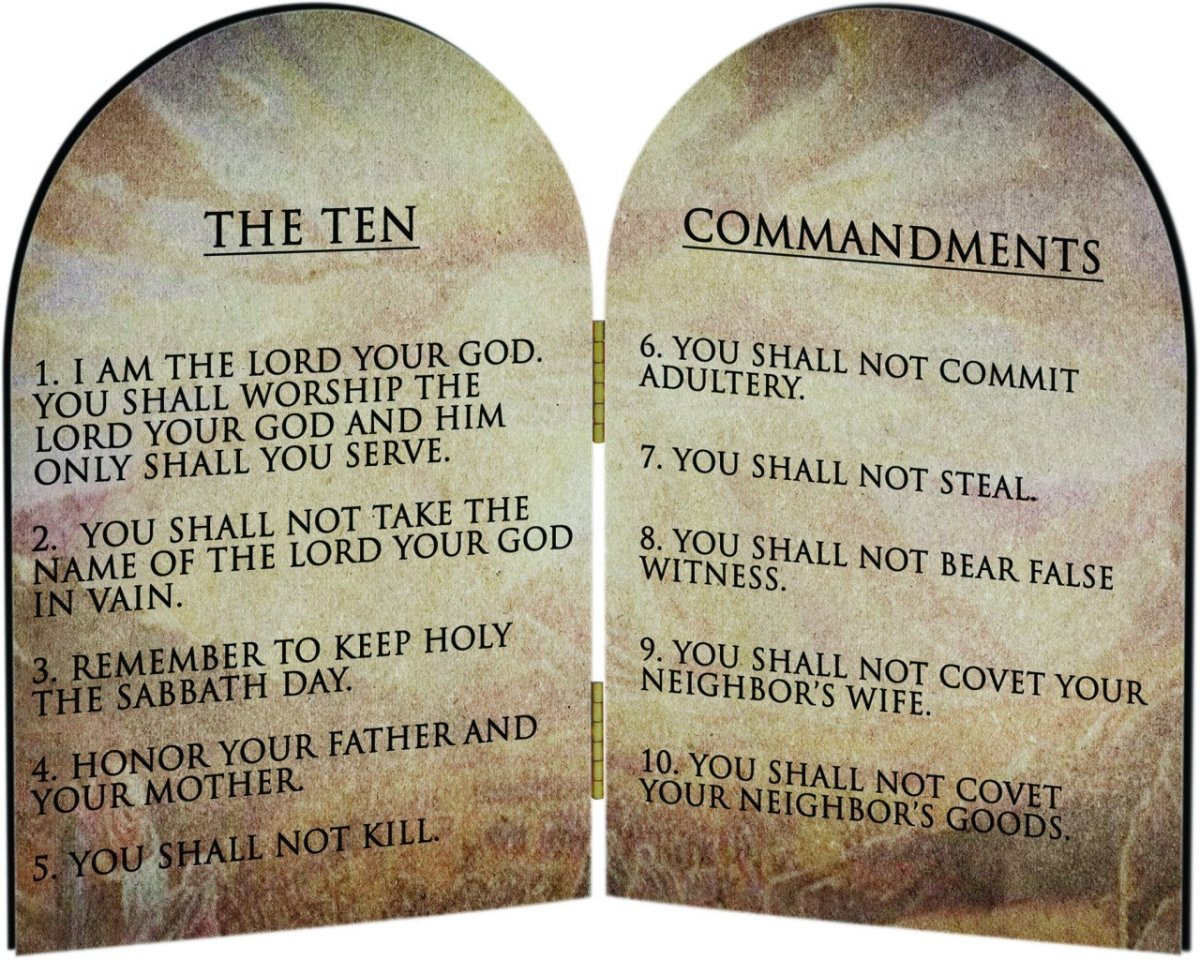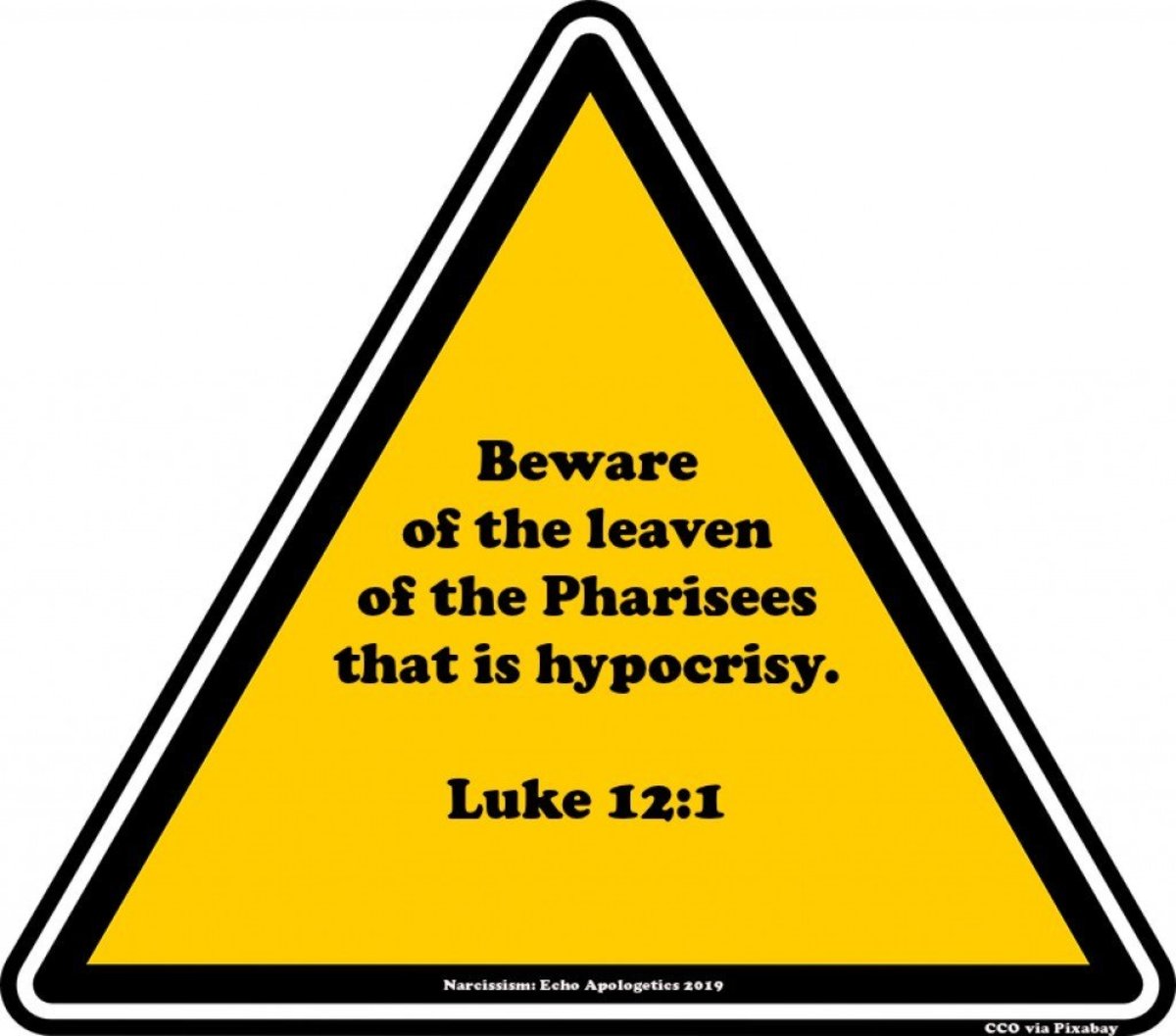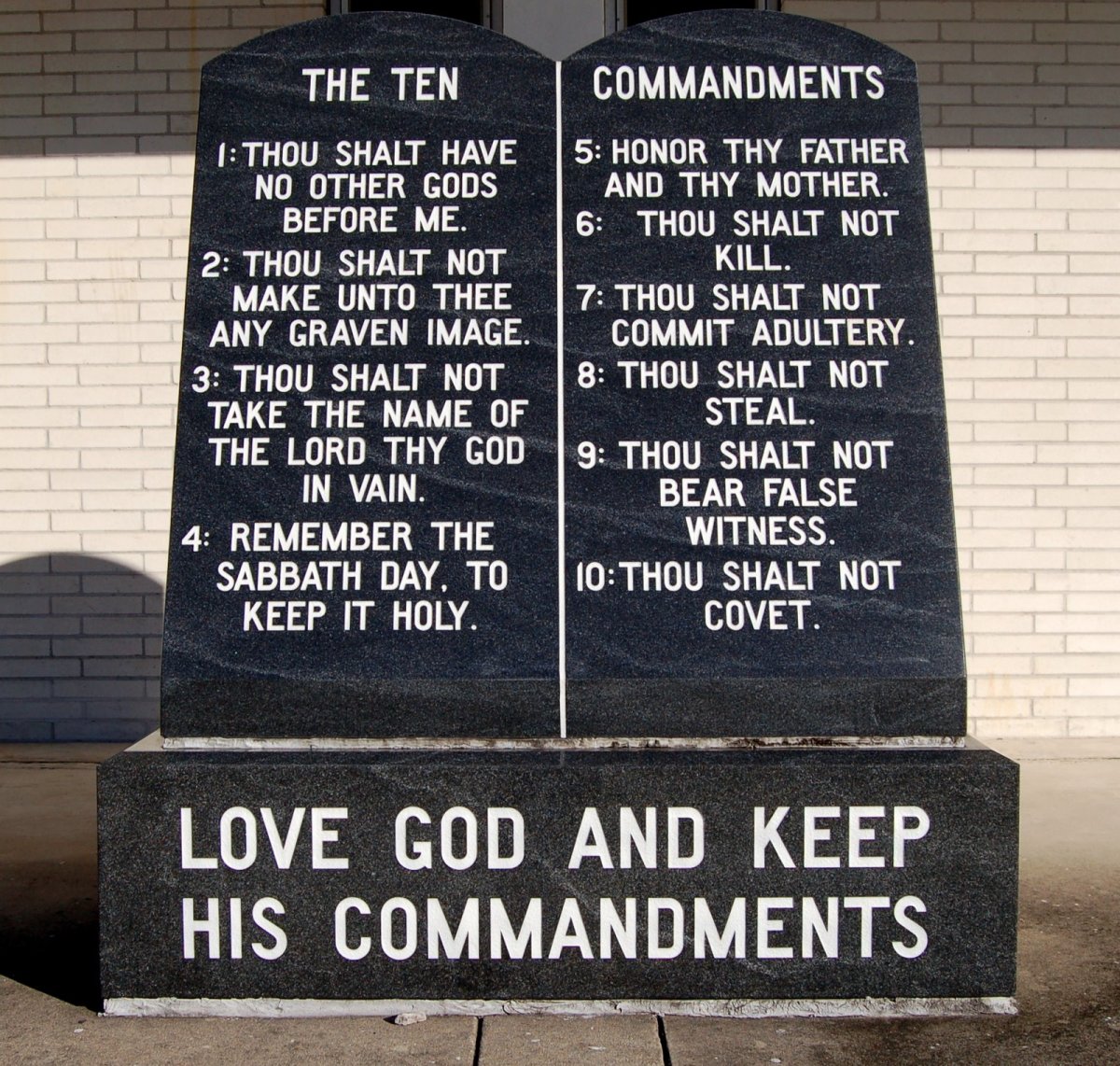The Ten
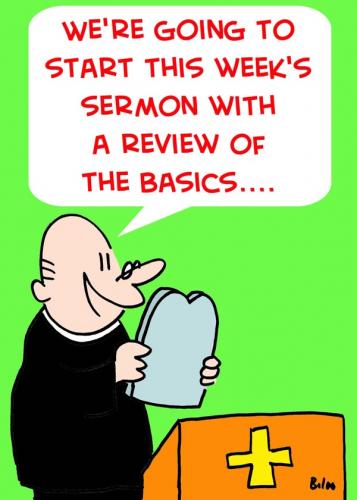
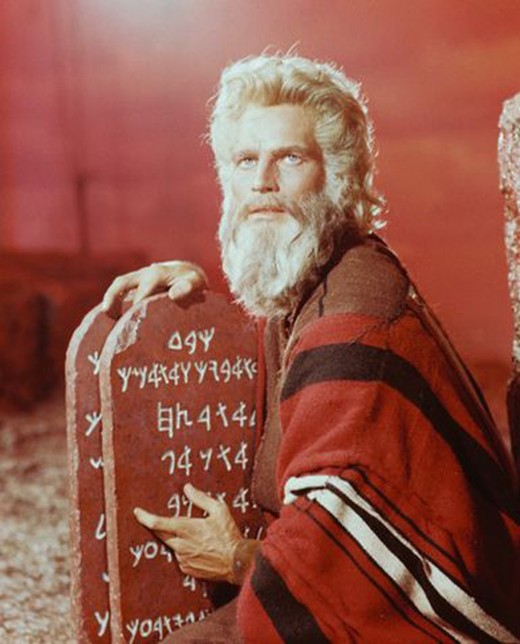
The Ten Commandments – to keep or not to keep?
This is a serious question. Aside from the religious implications, the results of keeping the Ten Commandments, or the lack thereof, are discernable in any society. We can see peace and harmony in the small villages, communes and sub-societies that embrace the law of God. Conversely, we need only look at the current condition of society to see what happens when there is no law of decency to break and people are free to function without restraints. I’ll talk more about that later.


The Arguments
Believe it or not, there are a number of churches which do not adhere to the Ten Commandments. That is to say, these churches actually ‘teach’ that we no longer have to keep the Ten Commandments. Although they will quote a few Bible verses which seem to support this belief, a closer look at what the Bible really says will show that nothing is further from the truth.
Here is a few of the reasons they give, in no particular order…
1. To teach that we must keep the Ten Commandments in order to get to heaven is Legalism (salvation by works)
2. There was no law before Sinai and it was given only to the Jews
3. Jesus gave us only two commandments – Love God and Love thy neighbour
4. The Ten Commandments were ‘nailed to the cross’, or ‘done-away with at the cross’
5. People of the Old Testament were under the law, but now we are in an age of grace (or something similar)
To the person who is familiar with the Scriptures, these can all appear to be valid or even factual statements. However, a proper exegesis will reveal something completely opposite (as usual).
What the Bible Says
1. Legalism
It is true that there are a number of churches, as well as religions outside of Christianity, which teach that we are to keep the Ten Commandments (or to perform similar deeds) in order to get to heaven. This is ‘salvation by works’ and it is not Biblical. Keeping the Law does not grant us salvation, but rather is a ‘product’ of our salvation. That is, when we know and love Jesus, we naturally want to reflect His character. We want to love others as He loves us, and the desire to keep the Ten Commandments becomes as natural as breathing. The main concern is that we accept Christ’s death for us on Calvary as atonement for our sins. When we accept Him thus as our personal Saviour, then by the indwelling power of the Holy Spirit, we want to stop sinning, that is to stop breaking His laws. We desire to please Him, to keep the commandments.
John 14: 15 If ye love me, keep my commandments.
John 14:21 He that hath my commandments, and keepeth them, he it is that loveth me: and he that loveth me shall be loved of my Father, and I will love him, and will manifest myself to him.
1 John 2:3 And hereby we do know that we know him, if we keep his commandments
1 John 3:24 And he that keepeth his commandments dwelleth in Him, and He in him. And hereby we know that He abideth in us, by the Spirit which he hath given us.
1 John 5:2 By this we know that we love the children of God, when we love God, and keep his commandments.
2 John 1:6 And this is love, that we walk after his commandments. This is the commandment, That, as ye have heard from the beginning, ye should walk in it.
As these verses point out, we keep the Ten Commandments because we love Jesus, and we love Jesus because He first loved us! It’s worth mention that these verses are taken from the New Testament.
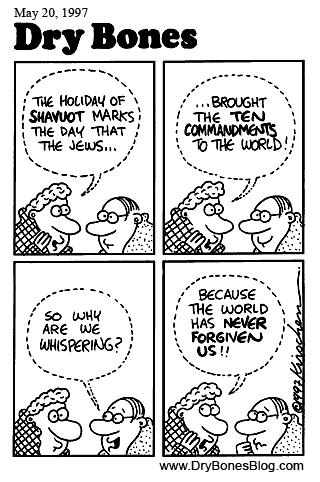
2. No Law Before Sinai - Given Only to the Jews
Romans 5:12-14Wherefore, as by one man sin entered into the world, and death by sin; and so death passed upon all men, for that all have sinned: (For until the law sin was in the world: but sin is not imputed when there is no law. Nevertheless death reigned from Adam to Moses, even over them that had not sinned after the similitude of Adam's transgression, who is the figure of him that was to come.
Here Paul tells us that there was law from Adam to Moses. He argues it this way: He says that there was death during that time, and that was the result of sin. But if there was sin, then there must have been a law to break
Exodus 16:4 Then said the LORD unto Moses, Behold, I will rain bread from heaven for you; and the people shall go out and gather a certain rate every day, that I may prove them, whether they will walk in my law, or no.
This verse comes when the children of Israel were still on their way to Mt. Sinai and is therefore evidence ofa law before Sinai, where the commandments were written on the tables of stone.
Exodus 16:27-28 And it came to pass, that there went out some of the people on the seventh day for to gather, and they found none. And the LORD said unto Moses, How long refuse ye to keep my commandments and my laws?
Again, the above verse makes it clear that God’s law was known before Sinai. It is interesting to note that this must have been known for a long time, for God asks the question of them, ‘How long?’
Genesis 26:5 Because that Abraham obeyed my voice, and kept my charge, my commandments, my statutes, and my laws.
In this verse we see that God had Abraham keeping ‘my laws’ before the time of Moses.
Isaiah 56:6 Also the sons of the stranger, that join themselves to the LORD, to serve him, and to love the name of the LORD, to be his servants, every one that keepeth the Sabbath from polluting it, and taketh hold of my covenant;
Here, God says this privilege is also extended to the Gentile or foreigner who joined himself to God.
Acts 17:2, 4 And Paul, as his manner was, went in unto them, and three Sabbath days reasoned with them out of the scriptures,… And some of them believed, and consorted with Paul and Silas; and of the devout Greeks a great multitude, and of the chief women not a few.
Here you have a whole ‘multitude’ of Gentiles keeping the Sabbath day, which we know is part of the Ten Commandments.
Acts 18:4, 11 And he reasoned in the synagogue every Sabbath, and persuaded the Jews and the Greeks… And he continued there a year and six months, teaching the word of God among them.
Again, we see both Jews and Gentiles keeping the Sabbath day.
We should easily see from the above verses that the idea of there being no law before Sinai, or that the law was given only to the Jews is just not true, according to the Bible.

3. Jesus Gives Only Two Commandments
Matthew 22:37-39 Jesus said unto him, Thou shalt love the Lord thy God with all thy heart, and with all thy soul, and with all thy mind. This is the first and great commandment. And the second is like unto it, Thou shalt love thy neighbour as thyself.
There are many who will tell you that from these verses we see that Jesus ‘replaced’ the Ten Commandments with only two. But when we look at the very next verse it becomes clear that this was not the case at all.
Matthew 22:40 On these two commandments hang all the law and the prophets.
The word “hang” tells us that Jesus was not replacing the Ten Commandments, but simply summing them up. The entire Law and the demands of the prophets are ‘based’ on these two commandments, not done-away with. Review the Ten Commandments and you will see that the first four show us how we are to love God and the last six define how we are to love our neighbour.
You see friends, although love should always be the motivating force behind our obedience, we still need specific commandments as a definition of God’s will, or we in our ignorance can err. It may become reasonable for some to believe that it is acceptable to steal from his neighbour or sleep with his neighbour’s wife as long as he ‘loves’ his neighbour. After all, he wouldn’t ‘murder’ his neighbour. Consider Romans 7 where Paul says that he did not even know it was wrong to covet until he was confronted with the commandment that forbids coveting.
Matthew 5:17-19 makes it clear that Jesus did not do-away with the Ten Commandments…
“Think not that I am come to destroy the law, or the prophets: I am not come to destroy, but to fulfil. For verily I say unto you, Till heaven and earth pass, one jot or one tittle shall in no wise pass from the law, till all be fulfilled. Whosoever therefore shall break one of these least commandments, and shall teach men so, he shall be called the least in the kingdom of heaven: but whosoever shall do and teach them, the same shall be called great in the kingdom of heaven.”
Some point to this verse and say that Jesus “fulfilled” the Ten Commandments and therefore we don’t have to. But in context, does that really make sense? Right before that part of the verse, Jesus says “I come not to destroy.” Does it make sense that He would He be saying, “I come not to destroy, but to… destroy?” Or… “I come not to destroy, but to do away with?”
You see friends, the word “fulfil” here means to ‘establish’. Jesus came to unfold the law and the prophets, to embody them in living form and to enshrine them in the reverence, affection and character of men. That’s what He’s saying in this text.
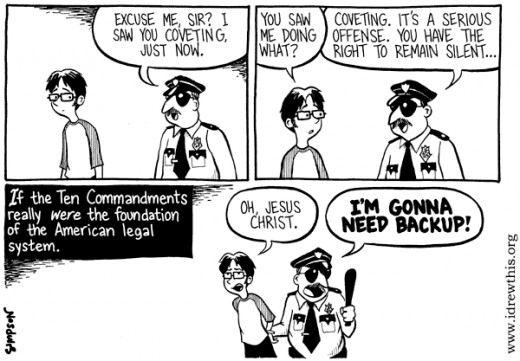
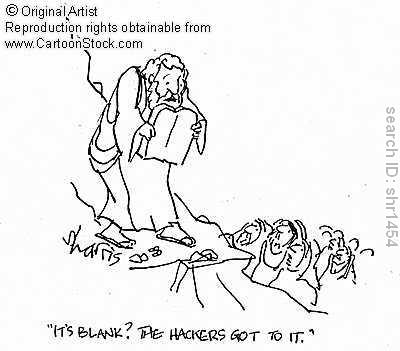
4. Done-away with?
Still, many will contend that in the New Testament it is all one law, which the apostle Paul vehemently worked to get rid of, because Christ had abolished it. A strong reference for this belief is found in the book of Romans. The King James version of chapter 10:4 says ‘Christ is the end of the law for righteousness to every one that believeth.’ However, the word ‘end’ (Gr. telos) as used in this text means ‘goal’ or ‘objective.’ Read it again in this context and you will see that the two words, ‘for righteousness’give us the key to this verse, and it is the exact point of this section on the Ten Commandments. As mentioned in point #1, Keeping any law will never make you righteous, and Paul always opposed this idea as a false method of salvation. On the other hand, we need to remember that he still preserved the law as a standard of revelation of God’s holy character and will. This is why he says in Romans 7 that the law is holy, just, and good, and even tells us that it is spiritual. Spiritual people delight to keep a spiritual law, but Christ is their only righteousness.
In the New Testament Paul emphasized that no one could earn salvation by keeping law. Repeatedly he taught that the only way a person could be saved and made righteous was by faith in the shed blood of Christ. But, so people would not go to the other extreme as many do today and conclude that there is no law for Christians to keep, he also contends that true faith, rather than doing away with the law, establishes it in the life of the believer.
Another strong reference that is used comes from the book of Colossians .
Colossians 2:14 Blotting out the handwriting of ordinances that was against us, which was contrary to us, and took it out of the way, nailing it to his cross;
At first glance, this verse does indeed seem to say that something was done away with at the cross – but was it the Ten Commandments?
Specifically, it says the “handwriting of ordinances, which was contrary to us”, so it would be reasonable for us to look into what these ordinances are.
As we look further into these ordinances we quickly see something many people do not seem to recognize, that is there are actually a few sets of laws referred to in the Bible.
Deuteronomy 4:13-14 And he declared unto you his covenant, which he commanded you to perform, even ten commandments; and he wrote them upon two tables of stone. And the LORD commanded me at that time to teach you statutes and judgments, that ye might do them in the land whither ye go over to possess it.
Notice how Moses clearly separates the Ten Commandments, which “He commanded you,” from the statutes which “He commanded me” to give to the people.
2 Kings 21:8 Neither will I make the feet of Israel move any more out of the land which I gave their fathers; only if they will observe to do according to all that I have commanded them, and according to all the law that my servant Moses commanded them.
Here we can see that the statutes which Moses gave the people were called a “law”. God speaks of the law “I commanded” and also the “law Moses commanded.”
Daniel 9:11 Yea, all Israel have transgressed thy law, even by departing, that they might not obey thy voice; therefore the curse is poured upon us, and the oath that is written in the law of Moses the servant of God, because we have sinned against him.
Daniel made the same careful distinction. Once more we see “thy law” and “the law of Moses,” and this time the two are recognized as having different content.
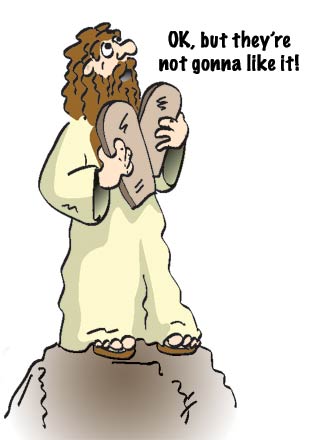
Friends, there are no curses recorded in the Ten Commandments that God wrote, but the law in which Moses wrote contained an abundance of such curses and judgements which were considered “against us.” The major difference, though, is in the way they were recorded and preserved. We know that the Ten Commandments were written by God, with His own finger, on two tables of stone and placed ‘inside’ the ark of the covenant (Cf. Deut. 4:13, Ex. 31:18 & Ex. 25:16).
Now look closely at Deut. 31:9, 24-26
And Moses wrote this law, and delivered it unto the priests the sons of Levi, which bare the ark of the covenant of the LORD, and unto all the elders of Israel…. And it came to pass, when Moses had made an end of writing the words of this law in a book, until they were finished, That Moses commanded the Levites, which bare the ark of the covenant of the LORD, saying, Take this book of the law, and put it in the side of the ark of the covenant of the LORD your God, that it may be there for a witness against thee.
We see that this book of statutes and judgements which Moses wrote in a ‘book’ was placed in a pocket on the ‘side’ of the ark.
Now we can note several distinctions in the two laws. They had different authors, were written on different material, were placed in different locations and had totally different content. Taking a closer look at the ceremonial ordinances that Moses wrote in the book, we see that they were, “for a witness against thee.” It is interesting to note that the curses and judgements of this law spelled out penalties for transgression which were missing from the Ten Commandments. For this reason, the ceremonial law was considered to be a law which was ‘against’ them.
We can now take a closer look at our primary verse for this section, Colossians 2:14…
Blotting out the handwriting of ordinances that was against us, which was contrary to us, and took it out of the way, nailing it to his cross;
As should be clear by now, there was nothing in the Ten Commandment law that could be defined as ‘contrary’ to Paul and the church he was writing to. It was not ‘against’ those early Christians to refrain from adultery, theft, lying, etc. Conversely, that moral law was a protection to them and favoured every interest in their lives.
Romans 7:7-14 What shall we say then? Is the law sin? God forbid. Nay, I had not known sin, but by the law: for I had not known lust, except the law had said, Thou shalt not covet. But sin, taking occasion by the commandment, wrought in me all manner of concupiscence. For without the law sin was dead. For I was alive without the law once: but when the commandment came, sin revived, and I died. And the commandment, which was ordained to life, I found to be unto death. For sin, taking occasion by the commandment, deceived me, and by it slew me. Wherefore the law is holy, and the commandment holy, and just, and good. Was then that which is good made death unto me? God forbid. But sin, that it might appear sin, working death in me by that which is good; that sin by the commandment might become exceeding sinful. For we know that the law is spiritual: but I am carnal, sold under sin.
Please note that after quoting the tenth commandment of the Decalogue Paul said, “the law IS holy… the law IS spiritual.” In other words, it was very much alive and operating when Paul wrote to the Roman church.
In contrast he described the “handwriting of ordinances” (Col. 2:14) in the past tense: “WAS against us… WAS contrary to us.” It is certain he was not speaking of the same law. One was present and one was past.
To summarize this section, we only need to look at 1 Corinthians 7:19, ‘Circumcision does not mean a thing, and uncircumcision means not a thing, but observance of God’s commandments [does].’ (KJV) Did you catch that? ‘Moses’ law (dealing with circumcision) does not mean a thing, but observing God’s commandments, does.
The truth is that there are numerous references in the Bible which prove that the law of types and shadows, because of its temporary application, was never considered on an equality with the eternal moral law. Its system of sacrifices, human priesthood and feast days were instituted ‘after’ sin entered the world and always pointed forward to the deliverance from sin which would be wrought through the true Lamb and Priest who was to come – Jesus.
Further References
Deuteronomy 5:22 – Here you will find that the Ten Commandments were a separate law which was written on tables of stone by God. Note here it says “He added nothing.” These were called the ‘tables’ or ‘tablets’ of the Testimony.
Exodus 31:18 – Written by God’s own finger
Exodus 40:20 – This Testimony (Ten Commandments) was placed into the Ark
Acts 15:5 – The law which commands circumcision is called the law of Moses
Galatians 5:2 – A whole law which contains circumcision (law of Moses as noted above) and such ceremonies, which is not to be kept
James 2:10 – A whole law which contains moral commandments forbidding adultery and murder, which we desire to keep in every point out of a heart of love, and we are going to be judged by it.
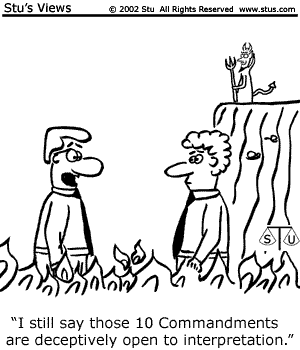
5. We Are Now Living Under Grace?
At this point, we must understand that the Ten Commandments are not the problem. Sin is the problem and the Ten Commandments point out our sin. The trouble is that some people, rather than dealing with the sin, would rather get rid of that which tells us we are sinning. Consider our reflection in a mirror which shows that we have a streak of muck across our face. Does getting rid of the mirror fix the issue, or do we need to wash the muck off?
Although it is true that God’s grace upholds us each and every day, does it really nullify the law? Has grace replaced the law and given us a licence to sin? Is it really one or the other – law versus grace – or both – law and grace?
Those who teach that the Old Covenant was the Ten Commandments maintain that Christ came to establish a new covenant containing only grace and promises, which is interpreted as ‘liberty to do as one pleases.’ This is a clever way to ‘have a good time’ and yet maintain a clear conscience. In order to eliminate the source of guilt (that which points out sin) the ‘way out’ was easy: “Salvation comes by grace alone. The inconvenience of commandment keeping is no longer necessary.”
Friends, this teaching implies that the law of God is harsh and cruel, yet we have seen that the law was not a set of boundaries, but rather was set in place for our protection and freedom!
Consider Mark 7: 7-9 Howbeit in vain do they worship me, teaching for doctrines the commandments of men. For laying aside the commandment of God, ye hold the tradition of men, as the washing of pots and cups: and many other such like things ye do. And he said unto them, Full well ye reject the commandment of God, that ye may keep your own tradition. (Emphasis added)
Jude: 3, 4 Beloved, when I gave all diligence to write unto you of the common salvation, it was needful for me to write unto you, and exhort you that ye should earnestly contend for the faith which was once delivered unto the saints. For there are certain men crept in unawares, who were before of old ordained to this condemnation, ungodly men, turning the grace of our God into lasciviousness, and denying the only Lord God, and our Lord Jesus Christ. (Emphasis added)
Lasciviousness means “license to sin.” It could also be defined as “unrestrained liberty” or “abuse of privilege.” In essence, this meant license to do what seems right in one’s own eyes, according to one’s own conscience.
Grace, on the other hand is defined as, “favour, kindness and mercy.” The biblical definition is, “divine mercy and forgiveness.” Notice that there is nothing mentioned about grace being a ‘licence’ to disobey God’s law. So then, to be “under grace” simply means to be under God’s divine mercy and forgiveness as a result of sincere repentance and resolve to obey God.
Consider the police officer who pulls over a speeding vehicle. As he approaches the vehicle and asks to see the drivers licence, he quickly notices that the driver is a well-known celebrity and one of whom he is a huge fan. He tells the driver that because he is a fan he cannot give him a ticket and decides to let the celebrity off with just a warning. This is grace. Now then, in this example would it be acceptable for the driver of the vehicle to push the pedal to the floor and burn some rubber as he pulls away, to continue speeding down the road?
The above example is qualified by the Bible in the book of John, chapter 8, verses 10-11 where Jesus confronted the woman caught in adultery…
“When Jesus had lifted up himself, and saw none but the woman, he said unto her, Woman, where are those thine accusers? hath no man condemned thee? She said, No man, Lord. And Jesus said unto her, Neither do I condemn thee: go, and sin no more.”
Notice Jesus did not say, “Ok, you may now go and continue in your sin,” but rather, “go, and sin no more.”
Still, some will argue that the evidence which shows that we are no longer under the law is found in Romans 6: 14-15, which says…
“For sin shall not have dominion over you: for ye are not under the law, but under grace. What then? shall we sin, because we are not under the law, but under grace? God forbid.
Although it does say plainly that we are “not under the law,” notice that it also says, “What then? Shall we sin? God forbid!” The argument, once again, comes from a misinterpretation of the phrase “not under the law.” Proper exegesis reveals that the phrase is more correctly interpreted as saying that we are no longer under the ‘penalty’ of the law.
This is qualified further in Galatians 5:18 But if ye be led of the Spirit, ye are not under the law
Correctly interpreted, the above verse tells us that if we are living a Christian life, then by virtue of obedience and grace, we are not under the penalty of the law – we are covered by God’s grace (divine mercy and forgiveness). However, we ‘are’ under the penalty of the law if we violate it as a way of life. That is to say, a person led by God’s spirit will strive to follow the law and will be forgiven when he stumbles or falls, but a person who refuses to acknowledge God’s redeeming grace, through faith in the shed blood of Christ will be condemned by that same law.
There is also Romans 3:31 which says ‘Do we, then, abolish law by means of our faith? God forbid. On the contrary, we establish law.’
You see friends, this idea of people being saved by the law in the Old Testament, and being saved by grace in the New Testament is a contradiction to Malachi 3:6, which tells us that God changes not! (Cf. Hebrews 13:8). That is to say, the Lord of the Old Testament is the same merciful God who became Lord of the New Testament.
God revealed Himself as a God of love and mercy in the covenant He made with Israel, as well as in the blessings that He promised for obedience. Throughout the Old Testament, as recorded in the Law, the Prophets and the Psalms, God manifested His love and mercy toward the children of Israel.
A thorough review of the Old Testament will reveal that God loved the children of Israel and desired to bless them, just as He desired that they in turn love, serve and obey Him. But God also made it clear that they had to respond to God by loving Him and choosing to keep His commandments of their own free will. God warned the children of Israel that if they did not choose to love and obey Him, and instead chose their own ways and served other gods, the result would be death and evil (Deuteronomy 30: 15-20).
The truth is that God’s grace is revealed all throughout the Old Testament. I could probably dedicate an entire Hub to that topic alone… and maybe I will in the near future. In the meantime please lookup and consider Exodus 33: 12-17, Exodus 34: 5-7, Deuteronomy 7: 7-9, 12-14, Deuteronomy 5: 8-10, just to list a few. Review carefully the Old Testament and you will discover that God extended His grace freely to individuals and nations who humbly sought His favor in Old Testament times. God granted His grace to Enoch, Noah, Abraham, Isaac, Jacob, Joseph, Moses, the children of Israel, the Ninevites, David, and even kings Ahab and Manasseh when they repented of their wickedness.
You see, the entire Old Testament is a revelation of God’s gracious compassion and mercy. However, the grace and mercy of God during Old Testament times was in most cases restricted to physical deliverance and material blessings. The Scriptures reveal that only a few in Old Testament times received God’s Holy Spirit and were granted the grace of God unto eternal salvation. Nevertheless, God’s blessing and grace was extended abundantly in the natural sphere for those who loved God and kept His commandments. And mercy and forgiveness was extended to all who repented from the heart.
The Old Testament is a history of those who sought God with all their hearts, and received God’s grace and blessing, as opposed to those who rejected God’s grace and blessing, and heaped to themselves punishment and wrath for their grievous sins.
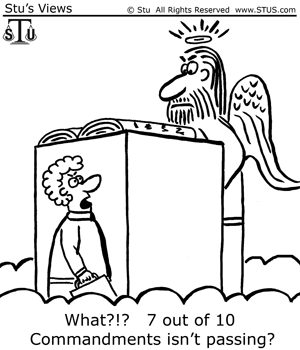
Friends, the writer of Hebrews tells us that many of the Israelites did not reach Canaan because of their disobedience and lack of faith. Similarly there is danger for Christians, that they will not finally be saved in the kingdom of God because of their disobedience and lack of faith.
It is very interesting to note that Hebrews specially links this up with the keeping of the seventh-day Sabbath, the one all Christendom trample on. Please don’t take that wrong way, there are many wonderful people in the churches throughout Christendom who sincerely believe they are pleasing God. Yet they ignore a test of religion Jesus summed up when He said, ‘If ye love Me, keep My commandments.’ (John 14:15).
Friends, in speaking of the end-times and up to the very last days, Jesus says in Revelation 14:12, “Here is the patience of the saints, those who keep the commandments of God, and the faith of Jesus.”
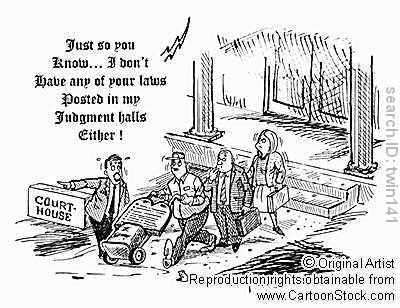
Let’s Be honest
Considering what we have reviewed in this Hub, let us now take another look at the Ten Commandments and ask what is there to do away with? Do we ‘want’ to worship any other God than the one true God of Heaven and Earth? Do we ‘want’ to worship idols? Commit murder? Adultery? Do we want kids to be unruly to their parents? Nay I say!
A true heart recognizes the Ten Commandments not as restraints, but rather as ‘protection’ from the evils of sin. Can you picture a world where these Ten Commandments are truly enforced? If you can, you will find a place where any person could walk down any dark alley, in any neighbourhood in the world, and feel safe. You will find a place where children could play at the parks with nothing to fear. Yet in today’s reality, kids aren’t even safe in their own front yards!
But what should we expect? We have taken the Ten Commandments out of our courtrooms and schools. We have taken ‘God’ out of the schools and replaced Him with the idea of evolution. We have taken prayer out of the schools. In essence, what we have told the children, and all future generations, is that they all come from animals, there is no God (and therefore there is no accountability or consequences for their actions) and there is no Heaven to attain unto. You live and you die – that is all.
Sadly, the result of such indoctrination is clearly seen in today’s headlines and news stories.
This was a long one, friends, but just a few more verses. Please prayerfully read also, Matthew 5:19, Matthew 19:17, 1 John 2:4 and 1 John 3:22
Thank-you for reading.
